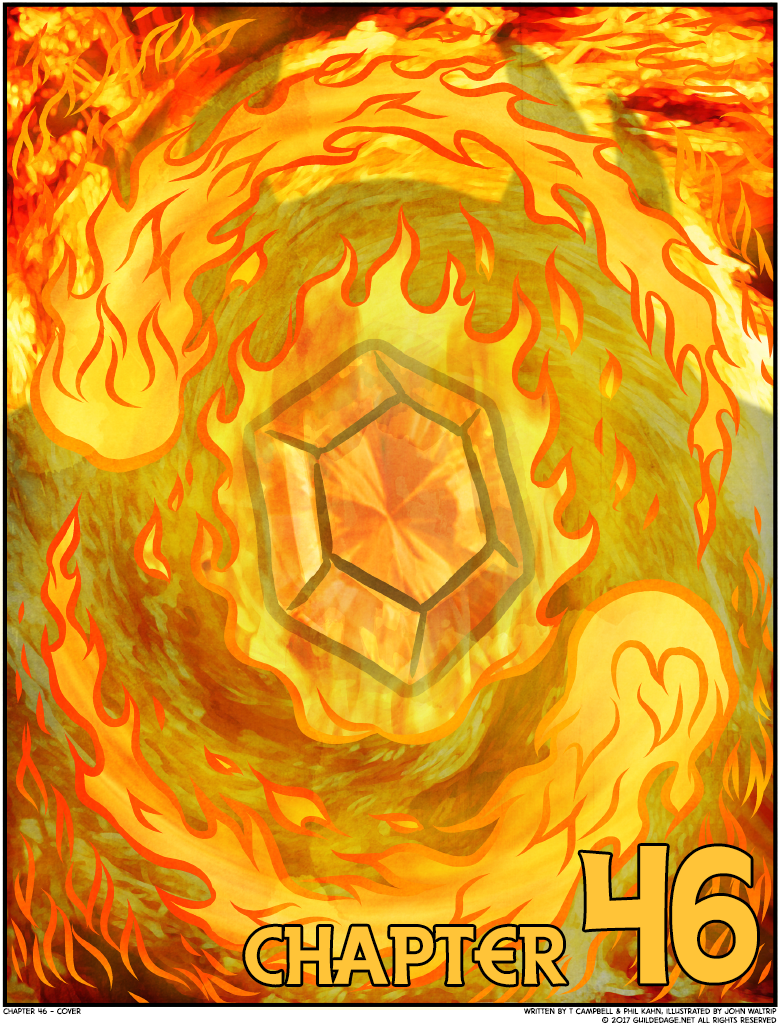Annotated Chapter 46 Cover
 This chapter was both the conclusion of an arc years in the making and a reaction to then-very current events. Just as the election of Donald Trump had made Taro’s rise more plausible to us, that same election made other forms of succession more palatable and interesting to think about. Troll succession has elements in it that would strike most people as barbaric. The incumbent or the challenger is gonna end up fucking dead. But there’s an unquestionable order to it as well, helped along by a mutually held respect for the process that, I swear, used to be part of American political life.
This chapter was both the conclusion of an arc years in the making and a reaction to then-very current events. Just as the election of Donald Trump had made Taro’s rise more plausible to us, that same election made other forms of succession more palatable and interesting to think about. Troll succession has elements in it that would strike most people as barbaric. The incumbent or the challenger is gonna end up fucking dead. But there’s an unquestionable order to it as well, helped along by a mutually held respect for the process that, I swear, used to be part of American political life.
But it was long before 2016 that we had decided Harky would be overthrown, in a way that trolls would respect and acknowledge as correct. Earlier versions of the story had Frigg doing this, since she was already a “troll queen” in another sense and we liked the idea of the Big Five all ending up as leaders of nations—Byron of Fightopians, Frigg of trolls, Syr’Nj of wood elves, Gravedust of dwarves/Savasi, and Bandit of gnomes or at least outsider gnomes. It’s true that all of them, even Frigg, will evolve into some kind of role like that, even if their “nations” ended up smaller than we pictured at first. But as Penk became a more effective character, it got clearer and clearer to us he was Harky’s true successor.
In-universe, the Fire’s-Eye may have had its own ideas about this. Maybe it knew before we did.











Given their advanced healing abilities, it seems kind of weird to me that trolls would come up with the idea of a battle to the death. Seems like it would be harder to fight (and to confirm victories) than for other species.
But it also means that the winner won’t be crippled for life.
It also means that you have to be proper serious about challenging someone, and very good at fighting.
The first bit has its advantages, that second bit … not really. Some might say that you need a fighter leading you in times of war, but being able to punch your successor where it hurts doesn’t mean you know anything at all about leading a people. Much like real-world political traditions, like being a rich asshole, being related to a family of famous politicians, kissing babies or looking good on camera don’t correlate particularly well with being able to preside over a government in a way that’s actually beneficial for most humans.
In that way, I think the Troll tradition is actually a scarily good match for how even proper democracies choose their leaders, even before Trump.
Alt-text didn’t make it.
You are incorrect. There was never respect within politics. First, the republicans have never respected anything close to resembling central or left views, and have been redistricting and gerrymandering for decades to make sure they can’t lose even in states where they have the minority. All that you see now is a slightly more mask off approach to what they’ve been doing for years, but on a national level.
Second, the democrats have themselves held the keys to power and the seats twice over now and done nothing to change the status quo. You may be confused as to why, but outside what the republicans are doing right now, the fact is that democrats serve the same masters. Money. They have for decades, it’s only gotten worse since companies were allowed to be considered people for donations, and it will only get worse now because people aren’t willing to acknowledge this fact. They had no respect for anyone voting for them and each and every one of them is slowly (or quickly) corrupted by power and money.
> First, the republicans have never respected anything close to resembling central or left views…
Not disagreeing with anything else, but feel the need to point out that the Republican party started out on the left, and the democrats on the right (by modern characterizations of left and right). So yes, they did respect leftist views, at least to the extent they believed in their own platform. And I’m inclined to think they held their positions with far more sincerity than we see from politicians today.
Well, the Republicans started out left-er than the Democrats, but mainly because they didn’t like how the plantation economy tended to squeeze small land-holders and wage earners. Not to mention the Northern industrialists. By the end of the 1800’s, the GOP was solidly in the grip of the “robber barons” – the industrialists/monopolists who produced The Gilded Age. Teddy Roosevelt was an anomaly; the Republicans returned to serving the larger corporate interests almost as soon as TR left office.
“Respect” maybe not in the way of governments honestly, sincerely trying to achieve the best for “the people” (Does Harky even do that? Is he not following his personal revenge plot?), but in the sense that presidents who lost an election didn’t usually put up a fight or call on their followers to storm the seat of government, after the vote was counted.
I’m noticing this pattern where people seem to become unable to tell the difference between something that’s not good and something that’s definitely and very clearly worse. And react to any mention of that worsening by “it wasn’t great before, either”, as if that negated whatever just happened.
If you’re unable to notice and acknowledge either things that improve or things that become worse, you become unable to actively support or oppose any those things.
“It’s all been rotten anyway” is exactly the argument the Polish government used to justify some “justice reforms” which effectively gave the justice minister the ability to hire fire members of the supreme court, by decree, the replacement of all important posts at public broadcasters by party members, and a couple of other such direct attacks on democracy. “Go away, nothing to see here, just business as usual, and the others ae doing it too.” They weren’t, of course, although they were of course also no saints (duh).
This is autocracy 101.
This post aged well, I’m afraid.
But yeah, the inability to ascribe any positive emotions to government or anyone in it, now or ever, is not the flex of intelligence that some people seem to think it is. Like, of course politics run on money and power. And you can reduce that to “power,” because money in this context is just a form of power. But another form of power is the ability to command respect.
I’m less in the “power always corrupts” and more in the “power always reveals” camp. Which is good news for our characters, considering where they end up in Chapter 50.